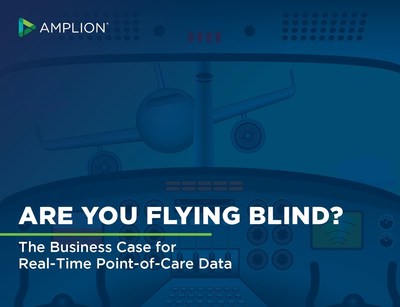Amplion Clinical Communications Affirms Point-Of-Care Data Is Critical To Improving The Health Of Hospitals As They Improve The Health Of Their Patients

NASHVILLE, Tenn., April 20, 2018 /PRNewswire/ Many U.S. hospitals today make staffing, patient care and business decisions based on what they think is solid data. But many times, the information is flawed.
Healthcare facilities should, instead, be looking at real-time, actionable, point-of-care data that can tell a hospital as much about the health of their organization as it can the health of their patients.
So believes Amplion Clinical Communications, a company that's disrupting legacy nurse call, helping hospitals improve patient care, patient safety and patient/ staff satisfaction.
In their newest eBook: "Are You Flying Blind? The Business Case for Real-Time Point-of-Care Data," Amplion makes a business case for the decision support available from their nurse call analytics.
"Hospitals are hampered in measuring the effectiveness of their staff at an individual level, meaning decisions about operations are many times made on imperfect information" said Frank Grant, president and CEO of Amplion. "Leaders should have timely feedback from the patient/customers in order to understand the true needs on the hospital floor and make staffing changes with confidence. With the real-time health system and its point-of-care data, hospitals are no longer 'flying blind' when it comes to making clinical and operational moves which can dramatically bolster both patient care and the hospital's bottom line."
Fortunately, more and more healthcare facilities are reducing their capital costs by replacing expenses with more effective technologies, Grant reported. They're demanding a quantifiable return on their investment by measuring and delivering on key performance indicators.
As the eBook points out, four KPIs proven to aid caregivers in making sound operational and clinical decisions include patient safety, patient satisfaction, operational efficiency and turnover.
Patient safety. Patient falls and pressure ulcers are two events that never need to occur. Not only do they increase a hospital's operational cost and length-of-stay, but they also open the facility to possible legal action. Amplion states that with real-time, point-of-care data, caregivers tend to round more regularly for those patients at a higher risk for either, greatly reducing these occurrences and their impact.
Patient satisfaction. Since HCAHPS scores place two percent of Medicare reimbursement at-risk, hospitals instinctively understand the importance of patient satisfaction. The biggest hindrance, however, is that survey data usually comes back weeks following the care too late to make timely improvements that could affect scores. Hospitals that have harnessed actionable data, Amplion affirms, now have the opportunity to immediately increase patient communications, improve staffing visibility, enhance rounding and patient response times, leading to higher patient experience scores.
Operational efficiency. Amplion's data has enabled clinical leaders to staff each shift based on real-time patient needs. That's helped caregivers optimize staff resources, reduce burnout rates, increase nurse retention and improve clinical performance.
Turnover. Eighty-two percent of nurses report workplace stress and seventy percent admit they're burned out in their jobs. With cost estimates of $82,000 to replace a registered nurse, reducing turnover can be one of the most substantial avenues to cost reduction. Using bedside data, high performing nurses can be identified, rewarded and retained, while those needing coaching can be mentored into higher performing employees.
"Viable data is needed to make decisions that create a better bottom line for today's hospital," Grant said. "Deploying strategic clinical communications platforms that can deliver real-time, point-of-care data will help caregivers significantly improve the changes they make in their hospital. And, certainly, ensure they'll no longer be 'flying blind.'"
About Amplion Clinical Communications
Amplion Clinical Communications disrupts legacy nurse call. The Amplion Alert Care Assurance Platform combines advanced nurse call capabilities, care collaboration tools, alarm management, reporting and data analytics in a system that tracks, manages and confirms care for every patient. These analytics help organizations make data-driven decisions and create accountability within clinical teams. It closes care loops, promotes teamwork and delivers the real-time point-of-care data nursing leaders need to provide safer, smarter patient care. Amplion Alert is in hospitals in more than 25 states across the country. www.amplionalert.com
![]() View original content with multimedia:http://www.prnewswire.com/news-releases/amplion-clinical-communications-affirms-point-of-care-data-is-critical-to-improving-the-health-of-hospitals-as-they-improve-the-health-of-their-patients-300633366.html
View original content with multimedia:http://www.prnewswire.com/news-releases/amplion-clinical-communications-affirms-point-of-care-data-is-critical-to-improving-the-health-of-hospitals-as-they-improve-the-health-of-their-patients-300633366.html
SOURCE Amplion Clinical Communications

Comments

Videos

